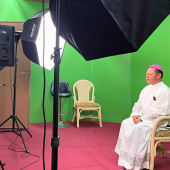Writing for God

I was wondering what to do.
“You are no good at this. Your writing is no better than a WhatsApp or Facebook post.”
Those words still echo within me, leaving me despondent.
“Lord, take this away from me, this urge to pour words out in writing about You, if it is not Your will,” I implored. “I do not want to offer mediocre work to You.”
Burdened by doubt, I turned to a kindly, senior Franciscan friar whose spiritual guidance I often seek for my writings. “Do not worry. Continue on this path,” he encouraged me. “The Lord will show you the way forward.”
The same encouragement came from a close friend who often reviews my drafts and offers constructive feedback. “Keep writing,” she said firmly.
Yet, all this reassurance did not feel enough.
So, like Gideon in Judges 6:11–24a, I asked the Lord for a sign: if He truly wanted me to keep writing, let Him show me.
And within a week of that prayer, doors began to open. I found opportunities to share my writings, including with Radio Veritas Asia, where editor received my submissions warmly and published them regularly. His encouragement was a sign from Him: I was being validated in this calling.
Still, I wrestle with bitterness toward the person who uttered those harsh words. A person who should have encouraged me, rather than discouraged me. I pray for the strength to forgive, though I admit that if I meet him again, I am unsure whether I can even greet him. I know it is not right to harbor such hurt. Christ calls me to forgive, as He forgave.
The path I seek to walk is not an easy one. It is narrow and hard, offering neither earthly fame nor fortune.
It is the path of a Catholic writer.
Vincent van Gogh once wrote, “One may have a blazing hearth in one's soul and yet no one ever came to sit by it. Passers-by see only a wisp of smoke from the chimney and continue on their way.”
That is how it feels to write. Through writing, one lets out glimpses of the soul, wisps of smoke rising from a hidden fire. Writing is solitary, deeply personal, and often frustrating. Yet, it is also immensely rewarding if one perseveres through its twists and turns.
Writing requires discipline. It is easy to lose touch if one does not write regularly. Discouragement and lethargy weaken the mind’s ability to form coherent words. But each writing challenge, each article completed, becomes a small victory. Every effort to embrace the pain of discipline becomes the beginning of growth.
I have discovered that the more open and vulnerable I am in my writing, the more it resonates with readers. Senior writers have reminded me repeatedly: discover your unique voice. Over time, I believe I have begun to find mine.
I have chosen to write within the Christian, specifically Catholic, genre of faith and spirituality. I know this is a very narrow field, and readership in general is shrinking. Catholic writers are few, and serious Catholic platforms even fewer. That is why I value spaces like Radio Veritas Asia, which give Catholic writers a place to share their words with discerning readers.
Yes, it is often lonely. Yes, it is often difficult. But it is also encouraging to hear the words of Pope Leo (July 29, 2025, to Catholic digital missionaries and influencers):
“Jesus called his first apostles while they were mending their fishing nets (cf. Mt 4:21-22). He asks the same of us today. Indeed, he asks us to weave other nets: networks of relationships, of love, of gratuitous sharing where friendship is profound and authentic… Be agents of communion, capable of breaking down the logic of division and polarization… Centre yourselves on Christ… with the beauty and light of Truth (cf. Jn 8:31-32).”
Those powerful words give me courage.
I know I will never be another Shakespeare, the world’s best-selling author. But if even one person is inspired by something I have written, if one reader picks up an article or a book because of my words, then my work has left a mark. A footprint on the sands of time.
Life passes swiftly, day after day, until our time here is gone. What remains are the words we leave behind, the wisps of smoke from our chimneys.
In summary, Thomas Merton’s words in Seeds of Contemplation give me clarity: “If you write for God, you will reach many men and bring them joy. If you write for men, you may make some money and you may give someone a little joy, and you may make a noise in the world, for a little while. If you write for yourself, you can read what you yourself have written, and after ten minutes you will be so disgusted that you will wish that you were dead.”
I wish to write for God.
Lord, help me. Use me as Your instrument, that through the words You inspire in me, others may come to know You.
Radio Veritas Asia (RVA), a media platform of the Catholic Church, aims to share Christ. RVA started in 1969 as a continental Catholic radio station to serve Asian countries in their respective local language, thus earning the tag “the Voice of Asian Christianity.” Responding to the emerging context, RVA embraced media platforms to connect with the global Asian audience via its 21 language websites and various social media platforms.














